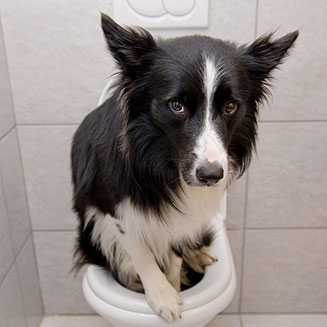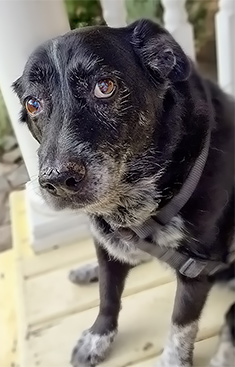Choosing a Vet
Selecting a vet to treat your dog is a very personal decision, based on so much more than professional competence and convenient location. How do you decide?

Start with board certification
The very first qualification your veterinarian must meet is being licensed by the veterinary board in your state or province. The purpose of licensing is to prove that the vet has the skills and knowledge required to practice. In addition, you can check to see if the license is in good standing, which shows you that there have been no substantiated complaints of incompetence or unethical behavior.
You can look up your prospective vet's license status by consulting the American Association of Veterinary State Boards website, where you can click through to your state board's licensing look-up site. Most states will include the expiration date of the license, the status (active, retired, student, probationary, etc) of the license, and any disciplinary actions which have been taken.
If your dog has developed a specific problem that needs specialty care, you can also search your state board's records for specialists in your area. For example, a veterinarian may choose to specialize in fields such as alternative medicine, dermatology, nutrition, neurology, dentistry, gerontology, or even a certain type of dog such as giants (Great Danes, Wolfhounds, etc.)
Association membership
You might want to check for membership in veterinary associations such as the American Animal Hospital Association, which assures you that the vet and his facility meet high standards in several areas of pet care.
Other associations your vet might choose to belong to include the Better Business Bureau or a small business association such as the Chamber of Commerce. Although these associations can't tell you anything about the care your dog will receive, they will assure you that the practice follows ethical business practices such as billing appropriately and collecting bills in a non-threatening manner.
Treatment approach
You probably started your search for a vet with a list of recommendations from friends or with a list from the yellow pages. Once you have assured yourself that the vets you are considering are properly licensed, you will need a way to whittle down the list to a manageable number for personal visits.
Ask your friends about their experiences with the vets they have visited. Did the vet rush to radical, expensive treatments or diagnostic tools when simpler, less expensive methods were available? For example, if a dog new to your family is throwing up, probably the simplest, cheapest thing to try first is to switch foods for a day or two and see if the problem clears up. Some dogs need a blander diet than others. However, some vets will immediately do blood work or take X-rays or otherwise spend your money right off the bat.
How hard is it to get an emergency appointment? If your dog runs in front of a car, will you have to wait a week to get his broken leg set? In less drastic situations, how far ahead do you have to schedule to get a Saturday or evening appointment so you don't have to miss work?

Does the vet actually listen to family members or rely only on the observations and tests he does at the facility? You are your dog's best advocate because you spend more time with him than anyone else. You want to make sure the vet values your opinions and observations.
Does the vet schedule enough time for each appointment or simply rush animals through to maximize his profits? Are routine visits handled by a technician or by the vet? If a technician or assistant is seen, how closely is he or she supervised?
Does the vet speak in plain English (or your language of choice) or does he use medical jargon and impossible to understand Latin words? You need to be able to fully comprehend what's going on with your dog's health and what you are expected to do at home to provide treatment. The best communication tool may be written instructions. Does the vet provide take-home information to the family?
Do they send out reminders for routine care or are you expected to remember on your own that your dog needs booster shots?
In-person visits
Once you have narrowed your list down to two or three possibilities, you may want to schedule visits to each facility. You don't necessarily have to see the vet during the visit, but you will want to evaluate the physical conditions of the office. Ask for a tour - preferably by setting up an appointment, not just by dropping in. You're making a trade-off between seeing them "au naturale" on an un-announced visit with making sure someone has time to show you around and answer your questions.
As you walk through, look for cleanliness and organization, as well as things like how overnight guests are treated. Are the dogs housed separately from the cats when they have to stay overnight so that everyone can get some sleep? Do any staff members stay with the animals overnight or at least check on them?
Check to see what additional services are offered in the building. Some vets sell accessories like leashes and food dishes; some share building space with a groomer or trainer. If it's important to you that your vet does or doesn't branch out into these areas, it's good to know before you get signed up. You'll also want to get a sense of whether or not you'll be pressured to purchase any of the products or services if you become a client of the veterinary practice. Another important part of most veterinary offices is the pharmacy. Does the vet insist you buy your dog's medications from him or will he give you a prescription to take elsewhere, which may save you some money?
You'll also want to get a sense of how the staff interacts with both humans and dogs. Do they truly care about animals? Are they courteous? Do they give instructions clearly when people are checking out? Do they look like they enjoy working there? Do they press for full payment from every family or do they allow people to make arrangements on their bills when needed?
Ask what lab facilities are available in-house and which services are outsourced. Very few vets can afford all of the diagnostic equipment they will ever need, but the most common tests should be done in-house. This might include blood work, X-rays, EKG, and ultrasounds. If the vet refers out all of these, how far do you have to drive to get the tests done?
What provisions are made for after-hours emergencies? In some instances, all of the veterinarians in a geographic area will band together to staff an emergency facility on a rotating volunteer basis. In larger cities, there may be a separate emergency clinic that most vets refer you to. In rural areas, the vet may just have you call him when night-time or weekend emergencies crop up.
Because the relationship between you and a vet may last a very long time, it's important that you take the time to properly evaluate your options and choose a vet who can accommodate your needs as well as those of your dog.
Find Veterinarians closest to you using our Free Doggies Veterinarian Search Tool. Simply enter your zip or postal code to find vets nearest to you.
Doggies Den: Latest Articles
 Homemade Thanksgiving Treats for Your Dog
Homemade Thanksgiving Treats for Your Dog
NUTRITION We all want to include our dogs in our holiday celebrations, but hopefully, you're aware that sharing table scraps with your dog isn't always the best idea.
 Keeping Your Dog Safe during the Summer Months
Keeping Your Dog Safe during the Summer Months
HEALTH Summer is coming on fast, so it’s time to plan how you will keep your dog safe and healthy through the lazy, carefree, warm days.
 Vaccination Time Again-Keeping Your Puppy Healthy
Vaccination Time Again-Keeping Your Puppy Healthy
DOG HEALTH So you have your new puppy picked out. There are quite a few shots, treatments and examinations that will keep the newest member of your family healthy.
 Canine Thanksgiving Feast
Canine Thanksgiving Feast
NUTRITION With the wide variety of food at Thanksgiving dinner, chances are you'll want to give your dog something special, too. If you're contemplating what to feed your dog for the holiday, here is a guide to a great Canine Thanksgiving Feast.
 Dog Walking Tips Every Owner Should Know
Dog Walking Tips Every Owner Should Know
DOG FUN Walking your dog is not only crucial to keeping him healthy and happy, it strengthens the bond between your canine friend and his caregiver. There are a lot of obstacles out there. Don’t forget these simple tips to keep your walk fun and safe in the outside world.
 The Benefits of Physiotherapy for your Dog
The Benefits of Physiotherapy for your Dog
HEALTH The same techniques that physiotherapists use to treat a variety of injuries and conditions in humans have been adapted to suit animals with great success. Family pets, show dogs, and working dogs can all benefit greatly from physiotherapy. Dogs whose activities involve a lot of agility are especially susceptible to the types of problems that physiotherapy can address.
 The Decision- Adding a Dog to Your Family
The Decision- Adding a Dog to Your Family
FIRST TIME OWNERSBringing a dog into your family is a decision where many people don’t realize it’s magnitude until after they have the dog. There are a number of things that you need to research before you decide to purchase a dog, and it starts right in your own home.
 Bringing Your Dog Into Your New Baby's Life
Bringing Your Dog Into Your New Baby's Life
HEALTH Many believe that a dog and a new baby cannot happily coexist, so therefore the dog has to go. This is not necessarily the case.  A new baby does not mean you have to abandon your dog.

Doggies Den:
Most Popular Articles

Dog Pregnancy Symptoms
HEALTHIf you suspect your dog might be pregnant, check out part one in this series on pregnant dogs, where we cover pregnant dog symptoms.

Dog Birth
HEALTHIn the third article of our dog pregnancy series, we look at the wonderful, but messy, process of bringing newborn puppies into the world.

Indoor Dog Potties
DOG PRODUCTSIt's been a long day at work. You were so busy, you didn't even take time to eat a sandwich, let alone run home to let your dog out. You're on your way home, knowing the poor dog is crossing his or her legs by now, when your car breaks down, delaying you even further. Can't somebody make this easier?

Your Dog’s Digestive System
PHYSIOLOGYEver wonder why your dog eats so fast? Or why he eats gross things? Or why he gets sick to his stomach? Or why his waste stinks so bad? Some of these things are normal, some are not.

Canine Respiratory System
BREATHINGThe basic function of your dog's respiratory system is to bring oxygen in to and remove carbon dioxide from the body. Knowing the symptoms of respiratory diseases can help you help your stay healthy.

Shelter Dog Adoption Tips for Success
ADOPTION Are you intimidated by the prospect of "rescuing" a dog from a shelter? One reason that you may be wary of adopting a dog from a shelter is not knowing how to choose. Adopting a dog from a shelter can be a rewarding process, if you're prepared to do a reasonable amount of research.

Canine Urinary Tract Infections
SYMPTOMS AND TREATMENTDoes your dog seem to be having trouble relieving his or her bladder? Learn how to recognize the signs of urinary tract infections and how to treat them before they spread.

What to do for Dog Diarrhea
SYMPTOMS AND REMEDIESIf you have dogs in your house for any length of time, you have likely experienced at least one bout of dog diarrhea. Beyond the pain in the tuckus involved in cleaning up the mess, you should know what causes diarrhea, and when it's important to see the vet.

What to do for a Dog Bite
DOG BEHAVIOR Getting bitten by a dog can be scary, and you may be tempted to run around in circles for a while, trying to figure out what to do. Here's our guide to help you manage the situation.

Top Ten Tips for Living with a Senior Dog
DOG HEALTH Bringing home a new puppy is so exciting, but it doesn’t take all that long for your exuberant puppy to grow into a senior dog who may have special needs. Here are the doggies.com top ten tips for taking care of your companion who has been with you through so much.
